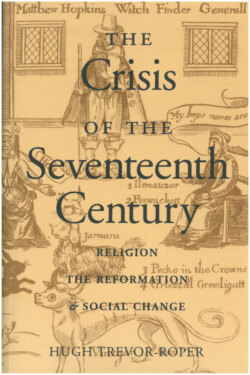The Crisis of the Seventeenth Century

Реклама. ООО «ЛитРес», ИНН: 7719571260.
Оглавление
Hugh Trevor-Roper. The Crisis of the Seventeenth Century
Отрывок из книги
The Crisis of the Seventeenth Century
1 Religion, the Reformation, and Social Change
.....
In face of this question, it is convenient to ask, what was the religious attitude of those actively engaged in economic life in 1500? Basically we can define it, for lack of a better word, as “Erasmianism.” I wish I could find a better word—one more obviously applicable to Italy as well as to northern Europe (for the characteristics were general)—but I cannot. Let me therefore make it clear that by Erasmianism I mean not specifically the doctrines of Erasmus, but those general views to which the early reformers, and Erasmus in particular, gave a clear form. These Erasmians were Christian and Catholic, but they rejected or ignored a great deal of the new external apparatus of official Catholicism: an apparatus which, since it absorbed energy, consumed time and immobilized property, without having any necessary connection with religion, was equally disliked by educated, by pious, and by active men. So, instead of “mechanical religion,” and of monasticism which had come to represent it, the Erasmians extolled “primitive Christianity,” private devotion, the study of the Bible; and they believed intensely in the sanctification of lay life. Against the exaggerated pretensions of the clergy, claiming that the clerical or monastic condition was, by itself, holier than the lay condition, the laity exalted the married state as being not a mere concession to base human nature, but a religious state no less holy than clerical celibacy; and they exalted the lay calling as being, if sanctified by inner faith in its daily exercise, no less holy than the clerical office. This belief in the positive religious value of a lay calling was seized upon by Weber as the essence of the “Protestant ethic,” the necessary condition of industrial capitalism. In keeping with his view of a new, revolutionary idea in the sixteenth century, Weber ascribed it, in its verbal form, to Luther and, in its real significance, to Calvin. But in fact, although Weber was no doubt right to see in the idea of “the calling” an essential ingredient in the creation of capitalism, he was undoubtedly wrong in assuming that this idea was a purely Protestant idea. His philological reasoning is known to be wrong. And, in fact, the idea was a commonplace before Protestantism. It occurs constantly in the works of Erasmus, who regularly extols the real, inner piety of the active layman in his calling above the complacency of the indolent monks who assume a greater holiness because of the costume they wear or the “mechanical devotions” which they practise.
In all this there is, of course, nothing explicitly heretical. Pressed to extremes, Erasmianism could be subversive of the clerical establishment. Put into practice, it would have diminished the number of the clergy, reduced their influence over the laity, cut down their means of propaganda, blocked the sources of their wealth. But as it was provoked only by the indecent number of the clergy, their indecent power and wealth, so, in normal times, it was unlikely to be pushed to extremes. Nor was it exclusively a doctrine, or rather a mental attitude, of the mercantile classes. It was an attitude which appealed to the educated laity in general. Erasmus had friends and patrons among princes and their officers, even among the clergy, as well as among the mercantile classes. Nevertheless there was a sense in which it was peculiarly the attitude of the bourgeoisie. In a time of crisis, Erasmian princes (like Charles V) would remember their “reason of state”: they might (like him) carry their private Erasmianism to the grave, but they would hesitate before attacking the vested interests of the Church, which were so involved with those of the throne—and indeed of the social order. Erasmian officers and lawyers, as a class, would follow their prince. Erasmian clergy, as a class, would go with the Church. Among the educated classes, the urban, mercantile classes—not the great tax-farmers or contractors, economically tied to the Crown or the Church, but the really independent, self-confident entrepreneurs—were most free to follow their philosophy to its logical conclusion, if they were forced to do so.
.....